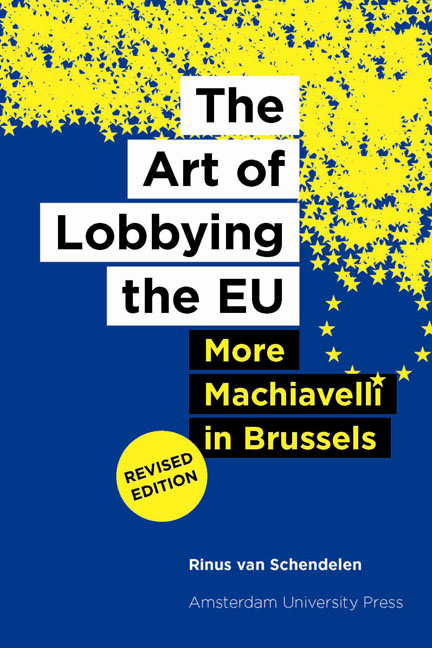Book contents
- Frontmatter
- Dedication
- Contents
- Detailed Contents
- Special Preface to the Fourth Edition: Ten Years’ Anniversary of this Book
- List of Figures
- List of Best Websites
- List of Abbreviations
- 1 The Europeanization of Public Affairs
- 2 The Playing-Field: EU Common Decision-Making
- 3 Pushing the Buttons of ‘Brussels’
- 4 Getting Grip on an EU Arena
- 5 Managing the Home Front
- 6 Managing the EU Fieldwork
- 7 The Limits of EU Public Affairs Management
- 8 Public Affairs, Lobbying and EU Democracy
- References
- Index
3 - Pushing the Buttons of ‘Brussels’
Published online by Cambridge University Press: 10 December 2020
- Frontmatter
- Dedication
- Contents
- Detailed Contents
- Special Preface to the Fourth Edition: Ten Years’ Anniversary of this Book
- List of Figures
- List of Best Websites
- List of Abbreviations
- 1 The Europeanization of Public Affairs
- 2 The Playing-Field: EU Common Decision-Making
- 3 Pushing the Buttons of ‘Brussels’
- 4 Getting Grip on an EU Arena
- 5 Managing the Home Front
- 6 Managing the EU Fieldwork
- 7 The Limits of EU Public Affairs Management
- 8 Public Affairs, Lobbying and EU Democracy
- References
- Index
Summary
In a republic with a great deal of equality, without idle noblemen, many people are trusted to participate as responsible citizens and, in Machiavelli's view (Discorsi I-55), such a system is more stable than any alternative. How much room does the EU offer to interest groups to ‘push the buttons of Brussels’?
I Managing the Crucial Variables
The ultimate goal of public affairs management (PAM) is to achieve a complete victory in a supposedly interesting game. Such an achievement requires winning in three arenas: the EU, which has to allow the desired outcome; the stakeholders, which have to deliver support; and the organization at home, which must provide backing. In real life, the chance of a threefold full score is low. Competition in the EU is usually extremely strong and hard. EU officials act under many cross-pressures, stakeholders have difficulty with trusting each other and the home organization is usually divided. Every pressure group, therefore, has reason to be satisfied if it has won a game only partially and/or has maintained its position in the fighting arena and/or has kept the home organization on its side. These three – compromise, respect and backing – might be seen as second-class prizes to win, but are in reality frequently valued as the highest attainable and thus satisfying achievements. They give a prolonged licence to operate. Of course, a pressure group may lose as well by not being party to the compromise, getting disrespect from others and/or losing backing at home. But as long as it lobbies ambitiously, studiously and prudently like Machiavelli, it seldom runs this risk. In short, the full score is normally only a daydream to all lobby groups, while the full loss is the nightmare that usually only befalls the amateurish groups. Both dreams have, however, their positive functions for the professional too. Without the daydream of becoming the complete winner and without the nightmare of ending up as the complete loser, no sportsperson can ever become a formidable player.
The definition of a desired outcome from the EU is, of course, up to every lobby group and can be anything. The main field of desires usually regards the decisions that bind those whom they concern and supersede domestic laws.
- Type
- Chapter
- Information
- The Art of Lobbying the EUMore Machiavelli in Brussels (Revised Edition), pp. 119 - 164Publisher: Amsterdam University PressPrint publication year: 2013



